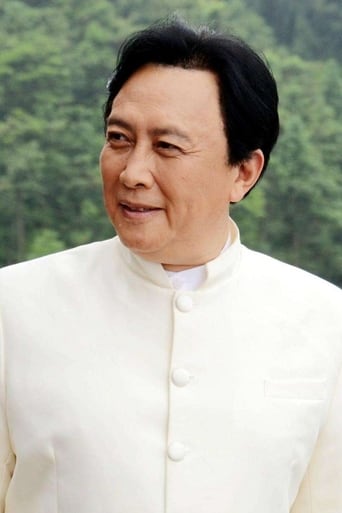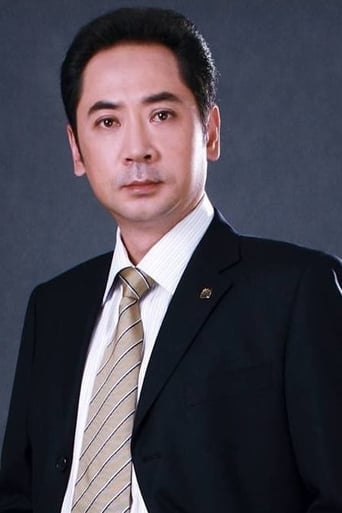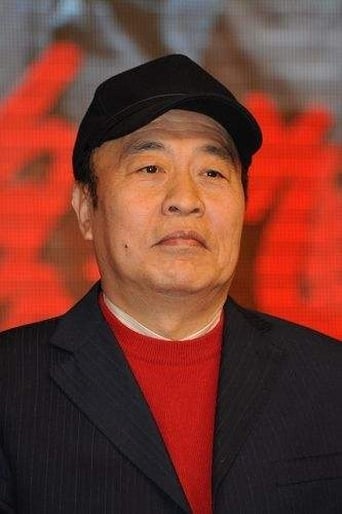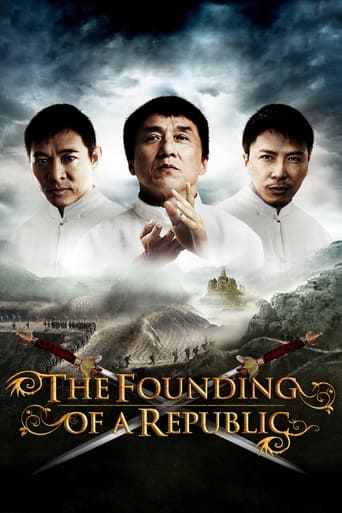
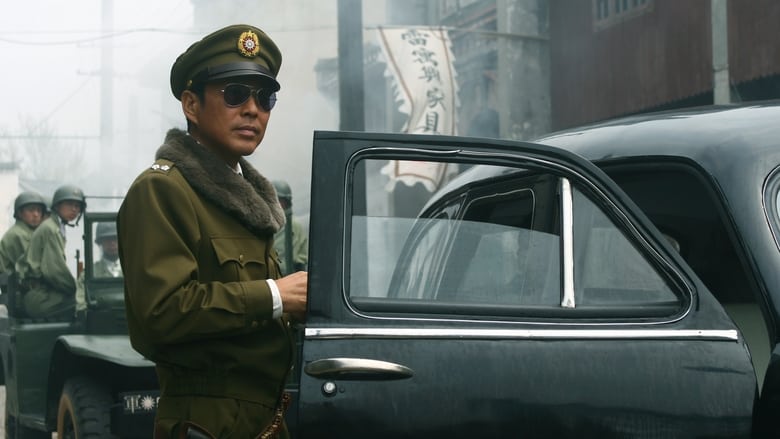
The Founding of a Republic (2009)
The tale of one man who fought against the tyranny of a ruler and led his people in battle in the ultimate sacrifice for his country.
Watch Trailer
Cast


Reviews
People must see this movie this movie as an entertainment, opportunity to see something produced in other country with not conventional story. Some people says its propaganda and judges by their political views, but these same people dont say the same when its US movies like Black Hawk Down, Saving Private Ryan, Chuck Norris and Stallone movies about Vietnam War/Soviets and etc. Those movies arent propaganda??????? Also US movies dont talk about their attrocities commited in those movies, because no country talks bad about yourself. If you expect that dont even watch the movie.The movie objective is to talk about the foundation of PRC and the film does well, have great actors, its good in their proposal. If you want to see costumes, behaviour of that times see the movie.
Currently, every film that is to be made in China has to be approved by the government first. Since this film is about the founding of the PRC, I expected that this film will be full of communist propaganda rhetoric materials. I was surprised that it has very few. It actually has some scenes which can be inferred to the current situation of Chinese communist party. Sundry celebrities appeared in the film, it is almost like watching the CCTV's yearly Chinese new year show.It seemed that it showed the history correctly without trying to make the Kuomintang people acting like idiots or clowns. Even though many historical people appeared in the film, this film is not hard to follow. I was captivated by it for the entire two hours.
The year is 1945. The two leaders of China's civil war meet in Chongching and agree to form a coalition government and prepare for peace and democracy.For reasons that aren't entirely clear, one side - the Nationalists (KMT) under Chiang Kai-Shek - decides it rather prefers to go back to the war, and the Communists (CPC) under Mao defends the future of Chinese democracy.Throughout the film, Mao is a benign presence. He's greatly admired by his followers and considerate even to his cook, mourning him when he's killed. He plays and dances with children. He is stoic in the face of disaster and he remains keen to include other parties (the Chinese Democracy League and even the KMT, although not Chiang) in a coalition government before bringing democratic reform. He takes decisions by reaching a consensus and demonstrates decisive wisdom by implementing land ownership reforms. At one point, and without any sense of irony, Mao says before giving a direct order, "I'll be a dictator for a change". Without any cities in their hands Mao plans a new country: the lack of a city for a capital is phlegmatically described as "inadequate" by the Great Helmsman.Meanwhile, the KMT has problems. The party is split with factions conspiring against Chiang Kai-Shek. Assassinations are organised. Corruption in areas they control is rampant - it's "in the bones" of the KMT, says Chiang, revealingly. There are food shortages and rampant black-marketing. Chiang is apparently another benign presence, but seemingly impotent in the face of such problems. Elsewhere, KMT soldiers and agents kill pro- democracy activists.The rest, as they say, is history.But that's precisely the problem with the film: the history.For overall, the film is a rather pedestrian telling of an alternative version of the founding of the People's Republic of China. Any sense of drama is limp like a balloon deflating, and thus fails. The dialogue is preoccupied with explaining events and giving background rather than (say) developing characters and it feels at times like a dramatised documentary. Indeed, in a couple of places, it even uses archive footage.As we know, though, this isn't just a film: it has (another) Official History to tell and tell it it will, come what may. It is an Orwellian exercise.The revision of Chiang Kai-Shek has been remarked upon above but the point missed. Chiang has been rehabilitated to a certain extent as a great Chinese patriot, although one who is mistaken. A key scene in the film occurs with his son: the KMT are deciding to negotiate with the CPC, and the proposal is that China be divided along the Yangtze River. Chiang himself says that this would be something he would never allow. This is in line with the "one China" ideology espoused by the CPC, and also by today's KMT, even if they can't agree precisely what that China is.We know that Chiang and Mao were both ruthless dictators who both could be personally cruel and who both presided over corrupt regimes. Both before and after 1949, both were responsible for the murder of large numbers of their own citizens, although Mao wins the numbers game if we're counting corpses. We also know that the remarked upon land reforms of Mao - who is officially 30 percent wrong - were a catastrophic failure, while those of Chiang Kai-Shek in the 1950s were in fact a success.Finally, we also know that democracy was never really the intention of either leader. The references to democracy in the film are surely in very poor taste when - as I write this - Liu Xiabo, the winner of the 2010 Nobel Peace, languishes in jail and a number of his peers were earlier killed in the Tiananmen Square massacre of 4 June 1989 for demanding precisely that: democracy in China.
The biggest problem with Founding of a Republic is that it is quite dull. An historic, or quasi-historic, film about the origins of the current government in China, the movie tends to be surprisingly free of anything of cinematic interest. The action is sparse, the dialogue is neither amusing nor animated, and all the major events are well-known to history students. The cameo appearances by several major Chinese stars, such as Jackie Chan, Jet Lee and Zhang Ziyi, are so short as to be hardly worth mentioning. We already know the outcome, and there is little in the film to hold the viewer's interest, aside from some of its subtle if unexpected features, such as its surprisingly enlightened attitude toward Chiang Kai-shek.In much of the propaganda that pervades previous characterizations of Chiang and his Nationalist forces, the Chinese Communists have tended to portray the Chinese civil war as one of black v white, good v evil, with victorious communist forces "liberating" the people from an evil regime. These words still appear today when it is advantageous to Chinese communists' interest. But in this film Chiang seems reflective, fair-minded and concerned over excesses in his own regime--a rather positive image.Mao is treated to several revisions, appearing jovial, tolerant, and even permissive of some forms of capitalism, the latter something Mao never actually was in his revolutionary days. Indeed, there is little revolutionary fervor in Mao's dialogue in this film, a fervor which in real life permeated Mao's thinking. This seems deliberate, as these ideas would accord little with the current regime in Beijing. In one scene where Mao is shown in an avuncular, loving role with children, even though in real life Mao abandoned his children to pursue his broad revolutionary ambitions.While KMT excesses are detailed, including several assassinations, there is absolutely no mention of CCP atrocities committed during the Chinese civil war. And, while KMT violations of the interim treaty between the two sides are highlighted, there is no mention of CCP violations of the same pre-civil war accords.While most of the film is richly detailed in costumes and settings, the special effects are not very realistic, with several airplane scenes being utterly unconvincing as they are obvious CGI. The film is a product of Chinese film makers, but political interests in Beijing factored heavily in its production. I doubt that the movie will generate much interest outside of China.


